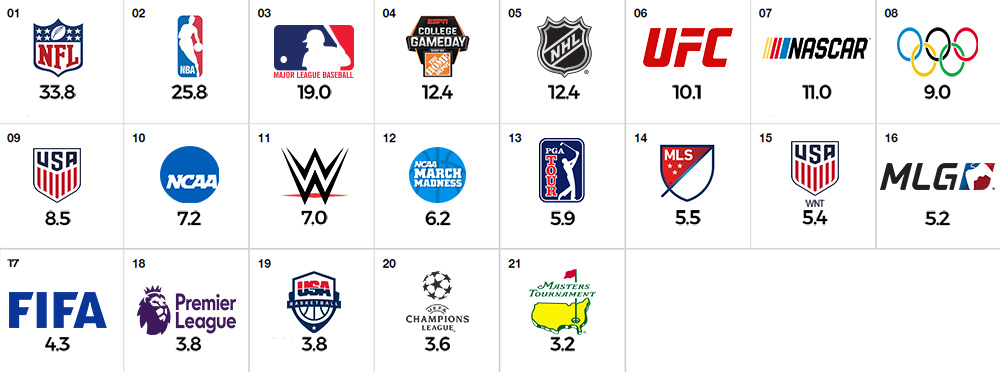Welcome to the inaugural Samford University Center for Sports Analytics NFL Relevance Rankings based on data from 6.9 million U.S. sports fans and developed in partnership with Affinio.
Teams SEP-17 NOV-17 DEC-18 OCT-18 AUG-19 Dallas Cowboys 7.85 8.01 8.55 8.54 8.5 New England Patriots 6.56 7.01 7.08 7.59 7.3 Pittsburgh Steelers 5.84 6.15 6.67 6.44 6.7 Carolina Panthers 5.55 5.75 5.95 6.01 6.2 Denver Broncos 5.59 5.69 5.81 5.96 5.8 Philadelphia Eagles 4.95 5.06 5.49 5.89 6.3 Green Bay Packers 4.84 5.27 5.14 5.33 5.2 Seattle Seahawks 4.88 4.89 4.89 5.23 5.0 Atlanta Falcons 4.45 4.6 4.69 4.84 5.0 Houston Texans 4.25 4.56 4.72 4.68 4.6 New York Giants 4.34 4.49 4.54 4.68 4.6 San Francisco 49ers 4.27 4.35 4.21 4.48 4.4 Oakland Raiders 3.86 3.97 4.22 4.28 4.4 Chicago Bears 3.95 3.74 3.71 3.92 4.0 Baltimore Ravens 3.45 3.61 3.58 3.74 3.5 New Orleans Saints 3.42 3.3 3.27 3.62 3.6 Minnesota Vikings 2.85 2.91 3.29 3.38 3.3 Detroit Lions 3.09 3.28 3.04 3.29 3.1 Miami Dolphins 3.19 3.22 3.09 3.21 3.2 Kansas City Chiefs 2.95 2.93 3.15 3.18 3.4 Cleveland Browns 2.74 2.82 2.6 3.17 3.4 Washington Redskins 3.01 3.02 2.81 3.04 3.1 New York Jets 3.05 3.18 3.06 2.97 3.3 Indianapolis Colts 2.77 2.75 2.72 2.82 2.7 Buffalo Bills 2.38 2.56 2.49 2.75 2.7 Arizona Cardinals 2.79 2.63 2.71 2.73 2.8 Los Angeles Rams 2.15 2.44 2.39 2.73 2.9 Los Angeles Chargers 2.28 2.61 2.22 2.69 2.6 Tampa Bay Buccaneers 2.34 2.52 2.52 2.54 2.4 Cincinnati Bengals 2.31 2.43 2.43 2.50 2.5 Tennessee Titans 2.24 2.21 2.19 2.49 2.6 Jacksonville Jaguars 1.85 1.94 2.09 2.27 2.3
What is relevance and why does it matter?
Relevance is a measure that taps into the emotional connection fans have with sports teams. Fans are drawn to the most relevant teams – the ones that connect with them on a deep emotional level (both positively and negatively).
An example from the realm of human relationship development demonstrates the significance of relevance. When you agree to go on a date with someone, there is something that initially attracts you to the other person -- something that differentiates them from other people. However, relevance is much deeper than the initial attraction. "Relevance is the one you marry because you cannot live without them. It is emotional and irrational, but the bond is strong.” (Elliot Schreiber, Ph.D.).
How are the NFL Relevance Rankings calculated?
The NFL Relevance Rankings are based on a deep dive into social media data from 6.9 million U.S. sports fans. Samford University Center for Sports Analytics and Affinio, a big data consumer insights company in Canada, ran a detailed study of U.S. sports fans during August of 2017 to ascertain NFL teams’ relevance. Our analysis, utilizing advanced machine learning algorithms and unsupervised segmentation technology, tapped into billions of interest variables and network connections.
By analyzing how 6.9 million U.S. sports fans are connected to teams, sports brands, events, athletes and sports reporters, we were able to develop the NFL Relevance Ranking for every team.
What is considered to be a "good" relevance score?
Each NFL team's relevance score (listed below its logo) is a custom measurement of the team's significance to U.S. sports fans based on its affinity score, audience size, and the number of members who already have this interest. Teams are given a score between 0-100 where 15 is medium, 30 is high, and above 40 is very high. As a point of comparison, the NFL as a whole produced a relevance score of 33.8 at the beginning of the 2017 season. The chart below highlights the relevance scores for various leagues, federations and sports governing bodies by U.S. sports fans as of August 2017.
League, Sep-19 College Game Day, 12.41,12.69 FIFA, 4.32,4.58 March Madness, 6.23,5.98 Masters Tournament, 3.24,3.18 MLB, 19.45,18.87 MLG, 5.27,5.34 MLS, 5.51,5.49 NASCAR, 11.22,7.19 NBA, 25.83,25.49 NCAA, 7.27,7.09 NFL, 33.86,33.60 NHL, 12.46,10.19 Olympics, 9.07,9.31 PGA Tour, 5.99,5.78 Premier League, 3.88,4.05 UEFA, 3.68,4.09 UFC, 10.17,10.18 US Soccer Federation, 8.55,8.59 USA Basketball, 3.85,3.90 USA WNT, 5.45,5.68 WWE, 7.04,10.73

Does Relevance change over time?
Some teams experience significant fluctuations in relevance while others are relatively stable over time. Relevance is built on the unwavering, passionate support that loyal fans have for the team. The larger and more passionate a fanbase, the more stable team relevance scores. Significant fluctuations in relevance are an indication that a team's fanbase is less engaged than the fanbase of teams that do not experience significant fluctuations.
All teams will experience small fluctuations in relevance over time. These fluctuations are based on team performance, players performance, coaching staff news, general team news, primary rival news, time of year, etc.
The Center for Sports Analytics regularly updates the NFL Relevance Rankings. Thus, check back to see how your team's relevance ranking varies over time.
Why rank teams based on relevance?
Businesses spend billions of dollars sponsoring sports teams in an effort to win customers. But not all sports teams are equivalent in their ability to drive positive brand associations. The ultra-successful sponsorship relationships are built between a company and a sports team that is highly relevant to fans. Thus, relevance is a powerful predictor of sponsorship success.
